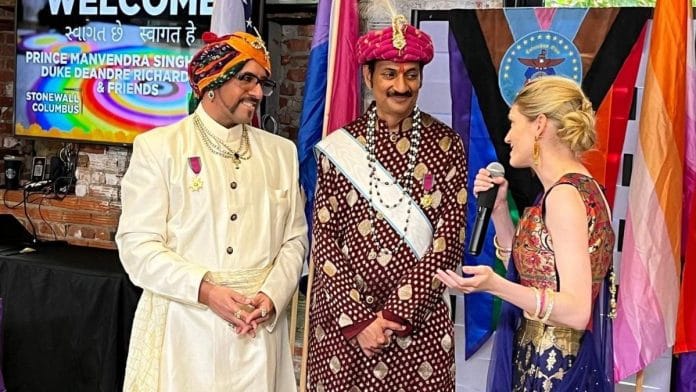New Delhi: He was publicly disowned by his royal parents, forced to endure years of “conversion therapy”, and even faced death threats for bringing “shame to the culture of India”.
But the ending was happy.
Years after the initial trauma of coming out, India’s first gay prince Manvendra Singh Gohil celebrated nine years of marriage on 6 July with partner Deandre Richardson.
Richardson announced on Facebook: “Ohio Statehouse — in 1800 Abraham Lincoln addressed the Ohio audience here. On July 6th, 2022 Crown Prince of Rajpipla Manvendra Singh Gohil and Duke DeAndre Richardson renewed their marriage vows (sic).” Same sex marriage is legal in this US state.
Gohil knew he was gay as young as 12. He came out to his parents only in his late 30s and at 41, he told the whole world in an interview to a local newspaper, the Insider reported.
His parents were initially not supportive and Gohil was forced to marry a woman. He also endured years of “conversion therapy”. But in 2013, he married his husband.
Gohil faced immense backlash from the people of Rajpipla for his sexual orientation. “The day I came out, my effigies were burnt. There were a lot of protests, people took to the streets and shouted slogans saying that I brought shame and humiliation to the royal family and to the culture of India. There were death-threats and demands that I be stripped off of my title,” Gohil was quoted in the Insider article.
Also read: Taj Mahal proposal, Kolkata marriage—Gay couple says we won’t run abroad to make it legal
Publicly disowned
Gohil’s parents went to the extent of publicly disowning him, publishing advertisements in the newspapers to announce that he was cut off as their heir. They said he was involved in activities “unsuitable to society”.
“My parents publicly disowned me from the royal family and disinherited me from the ancestral property,” wrote Gohil in this 2018 article for ThePrint.
Gohil’s parents’ angst was based on the idea that he could not be gay as his “cultural upbringing was rich”.
“They thought it was impossible that I could be gay because my cultural upbringing had been so rich. They had no idea that there’s no connection between someone’s sexuality and their upbringing,” Gohil shared with Insider.
Gohil shared his ordeal of being forced to undergo a cruel “conversion therapy” at the behest of his parents.
His parents looked for a “cure” for his sexuality and made him undergo various medical processes such as electroshock treatment. They also took him to spiritual guides and religious leaders to make him “behave normally”.
Gohil said he was left traumatised and depressed and often contemplated suicide by the time his parents stopped coercing him.
Fight against conversion therapy and ‘safe house’ for LQBTQIA+
The tension with his parents was resolved later and Gohil got the royal establishment of Hanumanteshwar in Gujarat as a compromise. After the Supreme Court decriminalised Section 377 in a landmark judgment in 2018 in the Navtej Johar case, Gohil opened his 15-acre palace grounds to become the first-of-its-kind LGBTQIA+ community centre in India.
It was aimed to empower members of the community who were ostracised by their family.
Gohil’s fight against conversion therapy continues as the practice has not been outlawed in the country. He is at the forefront to ban it.
Tamil Nadu is the first and only state in India that banned ‘conversion therapy’ in June last year.
However, Gohil has not only been fighting against “conversion therapy” but also for issues like same-sex marriage, dismantling regressive outlook, right to inheritance and adoption.
“It’s important for people like me who have a certain reputation in society to continue the advocacy. We can’t just stop because the country repealed Section 377,” Gohil said.
Also read: Human rights lawyer by day, Delhi’s beloved drag queen by night






